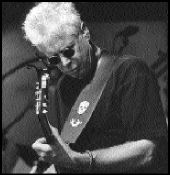When interviewing musicians, it’s always good to have a casual icebreaker. If the chat is being conducted via phone, “How’s the weather there?” usually does the trick.
But when Bruce Cockburn (pronounced CO-burn) reports that it’s sunny and warm where he’s sitting, neither of us is especially pleased. After all, Chicago in early March isn’t renowned for its hospitable clime. Such is the magic of global warming. “It’s weird,” observes the Canadian singer-songwriter. “All the places that are supposed to have winter aren’t, and places that aren’t supposed to are.” But he’s sure everything will work out OK eventually. “We’ll just give the oil companies more money, and everything will be fine.”
That biting sense of humor is just one of the qualities that have helped Cockburn rack up 20 gold and platinum records up north, and a trophy case full of Juno Awards since his eponymous 1970 debut. Although he made his big-gest American commercial splash with the lilting Top-40 hit “Wondering Where the Lions Are” in 1980, among die-hard music fans Cockburn is better known for “Lovers in a Dangerous Time,” one of the earliest musical meditations on AIDS, and “If I Had a Rocket Launcher,” both from the 1983 album Stealing Fire. The latter song, a blistering cry of rage born from Cockburn’s experiences in a Mexican refugee camp within firing range of war-torn Guatemala, became a surprise hit on MTV and garnered more airplay than any other disc in his career.
Since then, the 56-year-old has continued pursuing his muse, culminating in the new collection Anything Anytime Anywhere: Singles 1979-2002 (on Rounder/True North), which augments 14 classics with two new cuts, including “My Beat,” featuring guest vocals by Patti Griffin. “I went into it with a little bit of trepidation,” he admits of the anthology. “Obviously, I don’t listen to my records, so I wondered what I would think about what I heard. But in the end, it was fine. I thought the stuff held up quite well.”
After making his name with relatively introspective folk songs, the ’80s found the Ottawa native responding to the world around him with a dose of rock and pointed, political lyrics. Since then, he’s recaptured a mellower spirit in love songs like “Last Night of the World,” although he remains visibly committed to a number of causes, most notably the treaty to ban anti-personnel land mines signed by 121 countries in 1997. As part of a rotating caravan of like-minded artists including Emmylou Harris and Steve Earle, for the past three years Cockburn has hit the road in early December in the States “to commemorate the signing of the treaty and remind people that there’s a big, important signature miss- ing from it.”
Given the current state of world affairs and the stranglehold Stupid White Men (as Michael Moore dubs Dubya and company in his new book) continue to exert over America from Washington, D.C., surely Cockburn’s desire to write another call to arms ࠬa “Rocket Launcher” has returned? Not necessarily.
“A lot of people were shocked awake by the events of Sept. 11,” he observes. “Not everyone, but a lot of thinking people in this country are looking beyond their borders, maybe for the first time, in a serious way . . . and I find that encouraging. But in terms of songwriting, I write these songs to answer my own questions, and then if they’re useful to somebody else, great. To me, the question is, ‘How does the individual relate to what’s going on right now? What is the appropriate attitude and perspective to have on what’s happening in the world?'” For one answer, check out “Put It in Your Heart,” a new post-Sept. 11 composition Cockburn is showcasing on his current U.S. tour.
In light of his vast catalog and the range of topical and emotional ground he’s explored in song over the past 30-plus years, it’s hardly surprising that Cockburn says he views himself as neither an optimist nor pessimist (although, if pressed, he’d opt for the former) per se. “I think of myself as a realist, which is just looking at what is and trying to deal with it.”
“I find a lot of what I see around very worrisome,” he concludes (summer temperatures in the Windy City before St. Patrick’s Day, for example). “And I don’t have great hopes for the immediate future, because everywhere I look, I see things seeming to get worse, although it’s not universal. There are bright spots. But in the end, things will unfold according to God’s will. And if we, as a species, choose to stand in the way of that will, and are destroyed in the process . . . well, that’d be a great tragedy, but life goes on.”
Bruce Cockburn performs at the Moore Theatre on Fri., March 22. See the music calendar for details.






